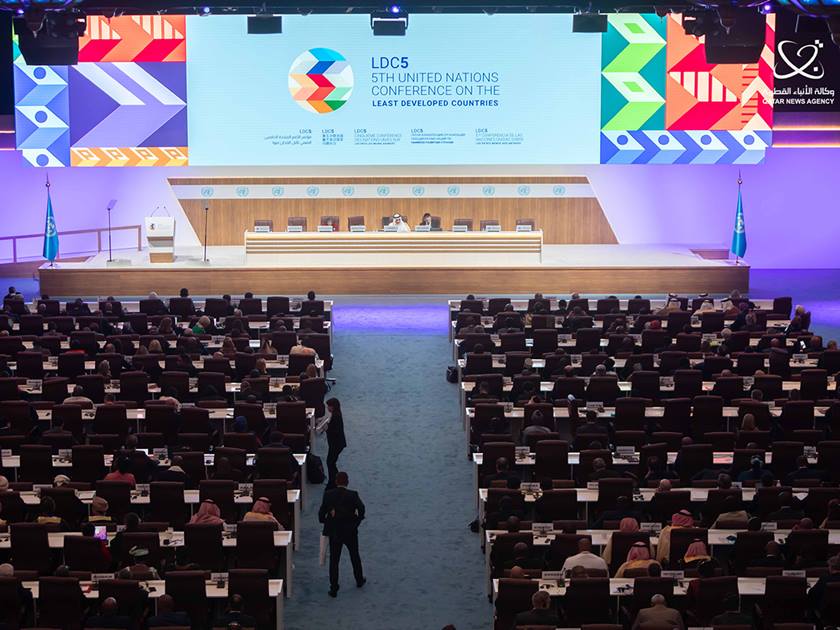ID :
654768
Tue, 03/07/2023 - 09:03
Auther :
Shortlink :
https://www.oananews.org//node/654768
The shortlink copeid
LDC5: High-level Roundtable 3 Hails DPoA as Key Driver for LDCs' Structural Transformation

Doha, March 06 (QNA) - Panelists and discussants at the 'High-level Roundtable 3' within the framework of the Fifth United Nations Conference on the Least Developed Countries (LDC5), stressed on Monday the importance of the Doha Program of Action (DPoA) to achieve comprehensive and sustainable structural transformation, capable of increasing productivity and growth in these countries.
Held at the Qatar National Convention Center (QNCC) under the title 'Structural Transformation as a Driver for Prosperity in Least Developed Countries', the round table stressed the need to strengthen and build partnerships, expand optimal investment in youth, support digital transformation processes, in addition to developing infrastructure, especially in terms of transportation and energy.
Interventions by lead discussants demanded the need to seek to link these countries with global and regional production chains, and to strengthen the service economy in them, as well as to work hard to develop the role of the private sector.
The structural transformation is essential for LDCs to enhance their economic resilience and achieve comprehensive sustainable development in the long term, with the need to focus on sectors that can contribute more to increasing productivity and promoting growth, leading to the provision of decent jobs that contribute to reducing poverty, the panelists and discussants said.
They called for the development of more measures, and the mobilization of international support, in order to enhance the capabilities of these countries to withstand multiple shocks, and to accelerate the achievement of the desired sustainable development goals in them, especially since there is no single pattern of structural transformation, which requires multifaceted approaches and coordination with various local and international partners and stakeholders in this regard.
The event was attended by HE President of the Republic of Sierra Leone Julius Maada Bio, HE Deputy Prime Minister and Minister of Physical Infrastructure and Transportation of Nepal Narayan Kaji Shrestha Prakash, and Professor of Economic Geography at the London School of Economics Prof. Andres Rodriguez Pose.
There were presentations by HE Secretary of State for Foreign Affairs and Cooperation of the Republic of Portugal Francisco Andre; Vice-President of the European Investment Bank Thomas Ostros; CEO of the Tony Elumelu Foundation Somachi Chris-Asoluka; Executive Secretary of the Economic and Social Commission for Asia and the Pacific (ESCAP) Armida Salsiah Alisjahbana and other representatives of countries.
The discussions focused on views and aspirations about mechanisms for renewing and revitalizing partnerships, and how to mobilize international measures to support the LDCs, in addition to the main challenges that may prevent these countries from reaching global production chains. They also touched on the repercussions resulting from the Covid-19 pandemic, and the effects of the European crisis, in addition to the problems resulting from the shortage of food, energy and fuel supplies, the low level of investments, and their repercussions on the LDCs' economies.
Participants believed that it is necessary to develop policies and take the necessary steps for structural transformation in the LDCs in order to move forward, support the efforts made and help them get out of this classification, and thus move from poverty to prosperity.
In this regard, the Nepalese Deputy Prime Minister and Minister of Physical Infrastructure and Transportation stressed the inevitability of moving from simple to advanced activities, as a prerequisite for economic and social development, pointing to the three challenges faced by the LDCs, namely investment in human resources, lack of developed infrastructure and the high costs and delays in industrial production.
Prof. Andres Rodriguez Pose indicated that there are approximately 643 million people living in areas where the per capita GDP is significantly low, indicating that many of the LDCs are not in a good position, but their conditions may be better than before. Without transparency, accountability and real political will, there will be a waste of financial resources; there is a great ability to measure the performance of government policies, so effective policies that achieve the desired goals should be put in place, he said.
The Portuguese Secretary of State for Foreign Affairs and Cooperation drew attention to the challenges the world is going through that pose great difficulties, requiring the integration of the LDCs into regional and global chains, while working hard to develop infrastructure in those countries, build partnerships, and promote foreign and intra-trade in addition to developing productive capacities, by investing in education and technology, strengthening the status of institutions and supporting them technically.
Vice President of the European Investment Bank stressed the issue of the cooperation of national authorities and the private sector to make the desired transformation a success, especially that Africa is blessed with a wealth of youth. But Africa needs long-term investments, and the private sector can be relied upon, as a basis to build and establish partnerships, he said.
Executive Secretary of the ESCAP addressed the various challenges that stand in the way of industrial policies in the LDCs, and the measures required for their development, stressing the importance of these policies in reducing poverty, especially since the majority of the workforce in these countries engage low-income and low-value activities. These countries need jobs and legislation to enable them to access markets, she said.
She stressed the importance of special economic zones in overcoming these challenges and encouraging companies to reach regional and global chains. Countries should support industrial policies, improve energy and transport, develop legislation to reduce production costs, and invest well in education to improve the services of the least developed countries. (QNA)





